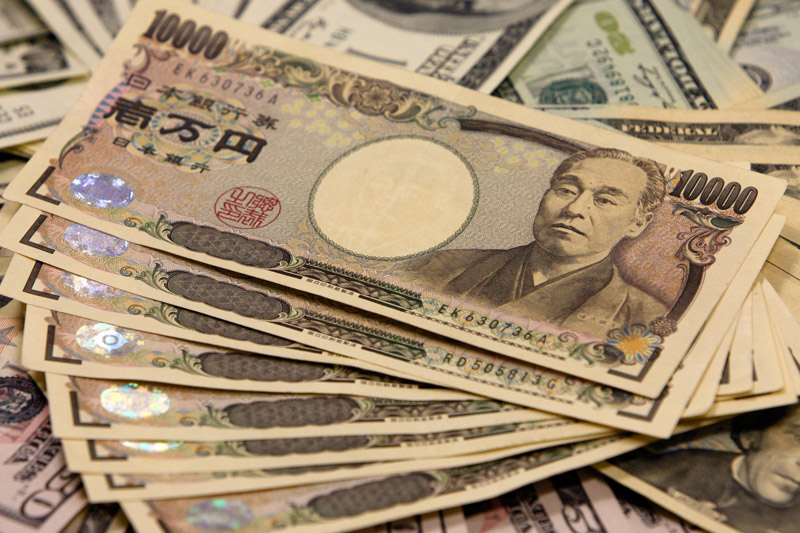Investing.com - The broadly weaker yen was down against most of its major counterparts on Wednesday, amid expectations for more aggressive monetary stimulus from the Bank of Japan following the approval of Shinzo Abe as the country’s next prime minister.
During early U.S. morning trade, the yen was down against the U.S. dollar, with USD/JPY climbing 0.58% to hit 85.37, the strongest level since April 2011.
Incoming Prime Minister Shinzo Abe was expected to announce his cabinet lineup later in the day. Abe has recently called for unlimited easing by the Bank of Japan in order to weaken the local currency and spur growth in the recession-hit economy.
In addition, minutes from the BoJ’s most recent policy-setting meeting showed that some monetary-policy committee members said measures should be adjusted to further weaken the local currency.
The yen was also lower against the euro and the pound, with EUR/JPY gaining 0.64% to hit 112.71, the highest since May 2011 and GBP/JPY up 0.66% to trade at 137.72.
Financial markets in Europe and London remained shut Wednesday for the Christmas break, resulting in low trade volumes.
Elsewhere, the Japanese currency fell against the risk-sensitive Canadian, Australian and New Zealand dollars, with CAD/JPY adding 0.48% to hit 86.02, AUD/JPY climbing 0.6% to hit 88.49 and NZD/JPY rising 0.1% to hit 69.86.
Market players remained focused on developments surrounding the fiscal cliff in the U.S., approximately USD600 billion in automatic tax hikes and spending cuts due to come into effect on January 1.
President Barack Obama, currently vacationing in Hawaii, plans to return to Washington on Thursday in order to take part in talks to avert the crisis ahead of the year-end deadline, the White House said late Tuesday.
Both chambers of Congress are also due to return to work on Thursday.
Without a deal, the U.S. could fall back into recession and drag much of the world down with it.
The U.S. is to publish industry data on house price inflation as well as a report on manufacturing activity in Richmond later in the trading day.
Trading volumes are expected to remain light because many investors have closed books to lock in profit before the end of the year, reducing liquidity in the market and increasing the volatility.
During early U.S. morning trade, the yen was down against the U.S. dollar, with USD/JPY climbing 0.58% to hit 85.37, the strongest level since April 2011.
Incoming Prime Minister Shinzo Abe was expected to announce his cabinet lineup later in the day. Abe has recently called for unlimited easing by the Bank of Japan in order to weaken the local currency and spur growth in the recession-hit economy.
In addition, minutes from the BoJ’s most recent policy-setting meeting showed that some monetary-policy committee members said measures should be adjusted to further weaken the local currency.
The yen was also lower against the euro and the pound, with EUR/JPY gaining 0.64% to hit 112.71, the highest since May 2011 and GBP/JPY up 0.66% to trade at 137.72.
Financial markets in Europe and London remained shut Wednesday for the Christmas break, resulting in low trade volumes.
Elsewhere, the Japanese currency fell against the risk-sensitive Canadian, Australian and New Zealand dollars, with CAD/JPY adding 0.48% to hit 86.02, AUD/JPY climbing 0.6% to hit 88.49 and NZD/JPY rising 0.1% to hit 69.86.
Market players remained focused on developments surrounding the fiscal cliff in the U.S., approximately USD600 billion in automatic tax hikes and spending cuts due to come into effect on January 1.
President Barack Obama, currently vacationing in Hawaii, plans to return to Washington on Thursday in order to take part in talks to avert the crisis ahead of the year-end deadline, the White House said late Tuesday.
Both chambers of Congress are also due to return to work on Thursday.
Without a deal, the U.S. could fall back into recession and drag much of the world down with it.
The U.S. is to publish industry data on house price inflation as well as a report on manufacturing activity in Richmond later in the trading day.
Trading volumes are expected to remain light because many investors have closed books to lock in profit before the end of the year, reducing liquidity in the market and increasing the volatility.
